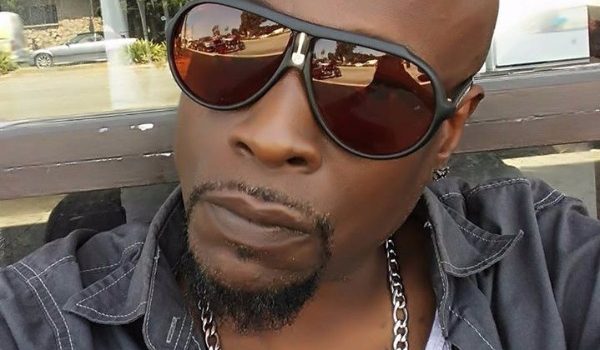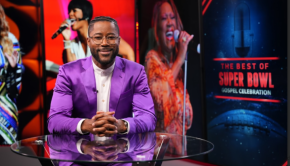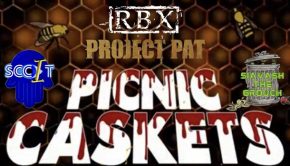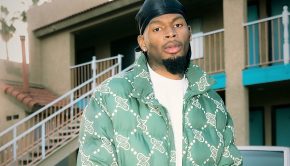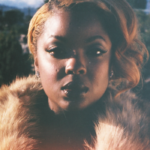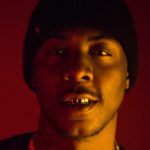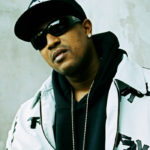The Production Of A Legend: The Moe Z MD Story
Legendary Producer Moe Z MD (@MoeZMD) chopped it up with The Hype Magazine about numerous topics including Prince’s style of music influencing his own writing styles and vocals infused with funk. He speaks on a rare unreleased remix of Prince’s “Halls of Desire” which he did for Tevin Campbell and the effect that Prince’s passing had on him.
He takes us through his humble beginnings at Antioch Baptist Church in Long Beach California, where he honed his skills on several instruments favoring the Drums. He learned lessons from Earth Wind and Fire’s attitude towards music and people and remains very humble since his days as a backup singer for the group. About EW&F Moe says, “Maurice White’s production of the group and how they did vocals shaped me as a producer and everything had to make sense.” Moe also reminisced on working with Radio and beatboxing against Snoop at an early battle between Snoop and another artist.
Moe has also worked with everyone from New Edition, Morris Day, to Michael Jackson and he shows no signs of slowing down.
We covered his early recording days with Tupac Shakur and the pain he felt when Pac was shot and when he was killed. Moe delves into how he secured work and tours with John Cougar Mellencamp even though Dr .Dre was John’s first thought when reaching out to a producer from the Hip Hop community. Moe is so much more than a Hip Hop producer as he has crossed genres his whole career, but when you’ve worked with the best in Hip Hop, we as a culture take notice of that and we salute you.
How did you come up with the name Moe Z MD?
I was about 14 or 15 and I really started listening to Prince and he had a drummer at the time name Bobby Z and I said you know what, I can be in Prince’s band and I’ll be Moe Z and also Prince also had a name he used when he was producing. He would call himself Jamie Star so I took the star and I made Moe Z Star and that’s what I was known us for a while
How did Prince’s passing affect you?
It was real hard for me because for a lot of my early life music that I did was patterned off of the funk Prince did with his vocals and even his writing style. It was a real big influence musically in that way and it was like my brother that I grew up with passed away. I saw his growth throughout the years and followed him and I followed his struggles in his ups and downs so it was like a family member died it was really hard. I actually had a chance to do a remix for a song he did with Tevin Campbell which is called “Halls Of Desire” and I did the remix but they never used the single but I got a chance to get involved with something that he was involved in early in my career and that was pretty cool.
How did you get started as a musician? Was it by ear?
Yeah actually we would go to Antioch Baptist Church and the musicians that they had were very inspiring and they made me want to do what they were doing so at first I watch the drummer, his name was Mike Withers. I watched him play and I used to be on the floor with my sticks trying to mimic him but everybody else was so good to so I wanted to be everybody and my Daddy got my sister a little toy piano and I started messing around with it and I tried to play everything that came on TV commercials, little pieces of shows and I developed my ears so I started being able to follow along with things. I started making sense out of it and I just applied that to each instrument. It’s the same theories just different fingers and I love the drums the most because you have the most responsibility because everybody’s following you and it’s a challenge and that’s the instrument that I love the most that I have the most fun playing.
What did you learn from touring with Earth Wind and Fire early in your career that you still carry with you till this day?
Earth, Wind and Fire I would definitely say it’s an attitude towards music and towards people. They were real humble but very smart musically and that was the impact it had when I saw them and when I was able to go and sing with them it was like watching them in their element live. They had so many hits that it kind of made it important for me to write songs that would last more than just the time period that it’s in. When I really started paying attention to Earth, Wind and Fire I was older and it had been songs from the 70s and now I’m in the 80s and understanding it and I’m getting more in tune with it and I was really seeing what they were doing and I was approaching it from a different standpoint so I think really just listening to Maurice White’s production of the group, analyzing that and how they did the vocals just really shaped me as a producer. Those are the things I look for in all songs. I look for continuity and for things to make sense, not just random instruments or random vocals, everything had to really make you listen back to it. It’s a pattern. It’s more thought than normal.
[youtube https://www.youtube.com/watch?v=O97BXHF19N8]What was it like working with Radio which led up to you meeting and working with Tupac?
I met Radio of course in Long Beach and we were kids and we were young and the day that I met him he was beatboxing for Snoop in front of the high school and Snoop’s battling one of my homeboys and I was beatboxing for him and it’s like the mid 80s [Imitating Buffy from the Fat Boys] and Radio was awesome at scratching without a microphone and it was loud and the beats that he was doing was like, what!? That’s why they called him Radio because he could make sounds that were incredible He was the second one out of Long Beach to get a record deal and that was with Interscope and that was before Snoop and those guys got signed and originally my guy Keith Clark, who was one of my mentors was producing the project and they were having some issues so he asked me if I wanted to do some stuff so I hooked up with Radio and we made up a bunch of stuff that was like some gangsta stuff but then Snoop came and signed with Interscope and his gangsta stuff had gotten bigger and bigger and they had tried to make us make Radio sound more like Heavy D and eventually they wanted us to go back and revamp stuff as the gangster stuff got bigger. So we revamped it and did more gangster stuff and by this time to Pac and everybody had signed. Tupac was in John McClain’s office because that was Radios A & R was and Pac was like, “Who is that?” He was listening to the music so John told him who I was and at the time I had been producing but the things I had done were with Pop music so now this is Rap and I had escaped from Pop and this was my first professional rap thing so Tupac wanted me to do three remixes, one was “From The Cradle To The Grave,” “Running From The Police,” and “Lord Knows.” So I flip those trucks and I didn’t do too much to “Running From The Police” but I did some stuff to it and actually had Radio on the hook doing some rasta and they sent the tapes to Tupac and by the weekend he had gotten the cassette and asked me to send him some beats overnight. So I put some beats on there and he chose one but I didn’t know which one it was but by that following week I was in New York, they flew me out there to record it and that’s when he told me that “From The Cradle To The Grave” was going to be on the radio and they were going to make it for single. It was originally an R&B song that I had for someone that had returned it because they couldn’t do anything with it, so we spent like an hour just trying to get to all of my files together and Tupac finally played the cassette and I was like oh that’s an R&B song and Pac said, “Well it’s a rap now nigga,” so we start laying it down and by the time I finished it they had all written something to it, It was Tupac & Tha Outlawz but at the time they were called Young Niggaz and they were really young, I think the oldest one was Edi and he was 17 and the rest of the guys were younger than that and Pac was like respect Moe Z and he was really rough on them and everything so we recorded the song I came back to California and they told me he was going to use one of the remixes that I did on the album and it turned out to be “Lord Knows” and Tony Pizarro had a version and they kind of blended the two make that particular version of “Lord knows.” Then we took a break for about six months. I guess Tupac was going through whatever he was going through and he came to California in September and then it was on. I had never recorded that much. I’m a person that records every day, mostly all day since I was 10 years old, ever since I figured out how to record from tape to tape before I knew about multitrack but Pac wore me out because I had never recorded like that from overnight into the next night but I got used to it and after that we were cranking them out.
When John Cougar Mellencamp’s people originally tried reaching out to Dr. Dre for some drum loops how did you get that gig instead of Dre?
I think it was his manager who was actually making the calls called my publisher and my publish of course said no, you don’t need Dr. Dre you need Moe Z. So my publisher calls me and says “hey how would you like to produce Johnny Cougar?” and I was like that’s great, so now I’m leaving Hip Hop and going into Rock which is something that I knew I could do and I had the chance to prove myself and another genre which is now the fourth genre that I’ve had to prove myself in so I flew all my equipment out to Indiana to John’s studio and he said listen, “I got Raphael Saadiq out here to do some stuff and I wanted him to do some drum loops but he really ended up just playing Bass on a couple of songs. I got Junior Vasquez who is Madonna’s producer to do some stuff. I just want to see what you can do and this is the last song on the album let’s just see what you can do.” It reminded me of cradle to the grave because that was the last song on Pac’s album and he said, “Why did you bring all of this stuff,?” and I said I was told I was producing you and he got a hearty laugh out of that and he said, “No I produce myself, I just need some drum loops so let me see what you can do,” so he starts playing the song on the Acoustic Guitar and everybody’s around figuring out what we’re going to do and I got my headphones on so they can’t hear what I’m doing but I can hear what they’re doing so I’m throwing in samples of the D.O.C. and I’m scratching and I had the turntable so I went hard on it and we laid out a few tracks and he said, “What else you got?” So I started laying down different parts like the Organ and while that was playing back I was singing background, like mumbling background parts to what he was doing and he was like, “Ohh put that in there,” and 10 minutes later I’m stacking vocals and going hard and he says, “Moe that’s really good. I like what you did there, what do you think about touring with the band?” and I said okay. They had to get used to me because I came in from Eastside Long Beach shit and it was a culture shock for me and for them and we had to get used to each other but we did that pretty quick because I understood the music. With jumping genres as long as you understand the music and you put your heart into it people are going to feel it
How did u feel the 1st time that you heard that Pac had gotten shot?
Ohhh That was really rough. I was at the house and I was actually writing something for Radio’s album and he had left and said he was going to come back and we were going to do some more work. About a week or so before that I had been in the studio with Pac talking with him and my sister about the case that he was going through and he was about to go to court for it and he was telling us what was happening and so we were already charged up. I was supposed to go to that session and record but because I was recording Radio I couldn’t do it and so I remember just being on the floor after we had gotten in from the studio and I was writing and it was on the news that he had gotten shot in the studio and I’m like I was supposed to be there I’m glad I didn’t go but at the same time I felt bad because I wasn’t there to be there for him and by the time we had developed a brother kind of relationship and I would page them to go to the studio in the morning to make sure that we all got and things like that. After he got shot it just change the course of everything then we tried to keep working when he went to jail and we even tried to get a vocal of his on the phone when he was in jail and we couldn’t get it so that was the last time I heard his voice on the phone or in person or anything like that because when he went to jail it was like I want to get out but I can’t help you. I really wanted to help him and I really wanted to be there but I was struggling it was just really painful you know I couldn’t be there for him.
Where were you at when you heard about the Vegas shooting that he passed away from?
I was on tour with John in London when I heard about it and I had talked to Edi and Hollywood and K Dog I forget what they call him now but I had tried to talk to him when they was at the studio doing the death row thing and I was trying to get in touch with him like you know, what are you doing but they told me Pac didn’t really want to talk and I felt like he was kind of looking out for me because I voiced a strong opinion about not working with Suge Knight. I just didn’t like his personality and he was very rude to me when Dr. Dre introduced me to him. He slapped my hand out the way and he slapped my Dad’s hand out the way, he was just really rude so I had voiced to him that I wasn’t going to be involved with him and he was like, “Dr. Dre’s my favorite producer. I love their whole get down and I want you to get down.” I was like that’s cool but it was really a lot more to it and things just weren’t like you think they were. Pac did have his own label Out The Gutter Records that was on Interscope and he had aspirations of bringing out my label Funk House and some of the artists that I had that were on his album and I saw a bright future and it wasn’t one where we were dealing with Death Row.
What are you working on and what can we expect in 2017 from Moe Z MD?
In 2017 I’m revamping my label Funk House internationally and for the last 10 years I’ve been developing artists and songs and creating the environment and getting the business part straight so that we can operate as an independent but fully functional label taking it to a new dimension I’m still doing my productions. I’ve been working with Lil Half Dead on his album called Dead Serious in 2012 and we’re going to revamp that and bring it out under Snoop’s label. I’ve worked on a song with RBX it’s called “Three Alarm Fire,” and I’ve been working with Bad Azz. I’ve been doing stuff with him. I’ve got a new project that I’m right in the middle of with Morris Day and that’s going to be a fun album. We did a dedication song to Prince on there so I wrote and produced the majority of it, 8 out of 10 songs and with that I’m just having fun with the production in keeping along with the legacy of working with these legends. In08 and 09 I was part of Michael Jackson’s camp as a producer. I can’t really talk too much about that [Laughs] but you know it’s just keeping everything going and I also love to give back so I have all these artists that I’m getting back to and bringing them on and they have a lot of diverse energy. I can’t name them all because there’s too many to name but I’m working in a lot of different genres. Gospel, Rock, Alternative Rock, three different styles of Rap and R&B and it’s not age-specific it’s about the talent. I’m trying to take it back to where it used to be, it’s about the talent but I’m going to promote it like it’s a new day.
Give some final words to the young producers and artists coming up today?
When you’re chasing your dreams if you’re really focused on what you’re doing and you want to pursue that don’t let anyone stop you from doing that.
Second, make sure that you have your business straight in all aspects and if you don’t know what all the business is, find out and ask questions because you don’t want anyone to be able to take your money from you.
Third, do what you do from the heart and just be humble with it because it’s all about the best quality of what we can do and don’t settle because if we settle we don’t get out of it what we need to get.
Tweet
